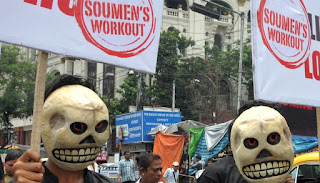WHO: BETTER CONTROL OF TOBACCO NEEDED IN ALL COUNTRIES OF WORLD
Prof Dr,DRAM,HIV /AIDS,HEPATITIS ,SEX DISEASES & WEAKNESS expert,New Delhi,India, +917838059592
The morbidity and mortality associated with Tobacco is so much alarming that it cause hugh economical burdern on the whole world by diseasing the public and causing death of many persons.In a latest report on the global tobacco epidemic, the WHO said about 4.7 billion people, or 63 per cent of the world's population, are covered today by at least one comprehensive tobacco control measure.But still more such warnings are on papers and symbolic.
Tobacco industries for making Bidi,Cigarette,Khaini,Zarda ,gutkas or nicotine powder has not been curtailed much ,only price has been raised for cigarettes but these and bidis are openly available,in rural or urban areas these products are openly available in countries like Nepal,India,Bangladesh etc which claim they have done great work to reduce it .The only reason behind lies in fact that these industries are run by many top industralists and businessmen having wide nexus with politicians and Bureaucrats beside Government earns a hugh excise duty and GST .Once money is earned then public health is hardly any concern in corrupt countries.
the World Health Organisation (WHO) on Wednesday called on countries to do more to prioritize these life-saving policies for control of tobacco.As tobacco use has still become the leading single preventable cause of death worldwide, killing over seven million people each year.Its economic costs are also enormous, totaling more than $1.4 trillion in healthcare and lost productivity, according to the WHO.
Meantime, the tobacco industry continues to hamper government efforts to fully implement life- and cost-saving interventions, by, for example, exaggerating the economic importance of the tobacco industry, discrediting proven science, and using litigation to intimidate governments, the report says.
 "Governments around the world must waste no time in incorporating all the provisions of the WHO Framework Convention on Tobacco Control into their national tobacco control programs and policies," says WHO Director-General Dr. Tedros Adhanom Ghebreyesus."They must also clamp down on the illicit tobacco trade, which is exacerbating the global tobacco epidemic and its related health and socioeconomic consequences."
"Governments around the world must waste no time in incorporating all the provisions of the WHO Framework Convention on Tobacco Control into their national tobacco control programs and policies," says WHO Director-General Dr. Tedros Adhanom Ghebreyesus."They must also clamp down on the illicit tobacco trade, which is exacerbating the global tobacco epidemic and its related health and socioeconomic consequences."
The new report, focusing on monitoring tobacco use and prevention policies, finds that only one third of countries have comprehensive systems to monitor tobacco use. Controlling tobacco use is a key part of the UN 2030 Agenda for Sustainable Development, which aims, among other targets, to reducing one third of premature deaths from noncommunicable diseases, including heart and lung diseases, cancer and diabetes.
- Kidney stones universally present hazard in north india,dillution by water prevent it
- Steroid and placebo effect equally for mild persisting asthma with low sputum eosinophils
- Government wants to fix public healthcare staff shortages with ayush docs: will it work?
- Plea in hc for payment of salaries of edmc, north mcd teachers and doctors
- 7 indian pharma companies named in us lawsuit over inflating generic drug prices
- Woman in up dies after explosion in her mouth during treatment,what is diagnosis?
- Woman in up dies after explosion in her mouth during treatment,what is diagnosis?
- Woman in up dies after explosion in her mouth during treatment,what is diagnosis?
- Air pollution ! mothers organising rally in london,anaesthetist choosing gas,will india follow?
- Cardiac arrest is always not sudden as understood -a study

 Comments (
Comments ( Category (
Category ( Views (
Views (